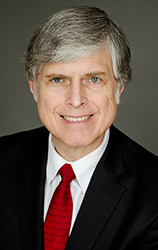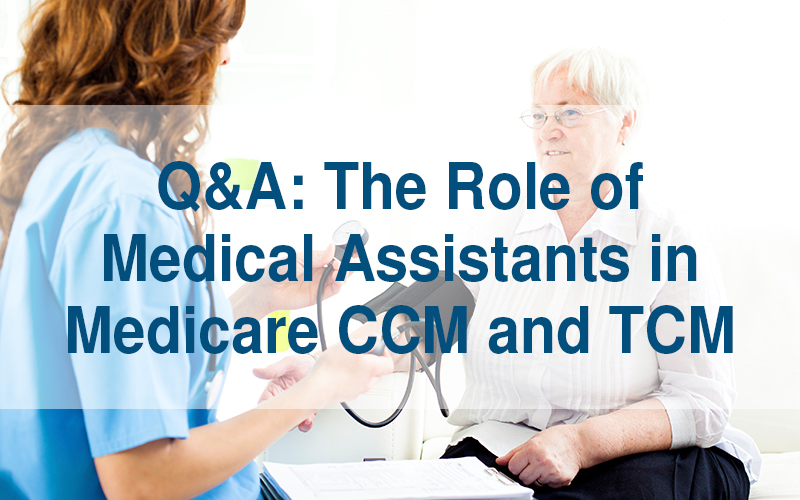Q&A: The Role of Medical Assistants in Medicare CCM and TCM

Donald A. Balasa, JD, MBA, CEO and Legal Counsel at American Association of Medical Assistants (AAMA), presented the webinar “The Role of Medical Assistants in Medicare CCM and TCM.” Mr. Balasa returned to answer many commonly asked questions.
You mentioned that medical assistants are certified, not licensed (in almost all states). How are you defining certification and licensing?
Licensing is a mandatory (usually state) credential without which an individual is prohibited legally from working in the profession or occupation. Certification is a voluntary credential, usually national in scope, that is awarded by a private sector certifying body. The Certifying Board of the American Association of Medical Assistants awards the CMA (AAMA) certification to medical assistants who have graduated from an accredited postsecondary medical assisting program and who have passed the CMA (AAMA) Certification Examination.
Why do medical assistants work as clinical staff only in outpatient settings?
Medical assistants are permitted to work in inpatient settings only as administrative staff, such as health unit coordinators, receptionists, and coding and billing personnel. Medical assistants are not permitted to work clinically in inpatient settings unless they meet the requirements and register with the state as certified nursing assistants (CNAs) and/or medication aides. This is due to the fact that there are separate laws addressing: (1) licensed provider delegation to medical assistants in outpatient settings; and (2) delegation in inpatient settings by registered nurses to nursing assistants, medication aides, and other personnel.
You stated that the meaningful use provisions of the Medicaid Electronic Health Record (EHR) Incentive Program require providers participating in this program to demonstrate that a certain percentage of medication, laboratory, and diagnostic imaging orders entered into the computer-based provider order entry (CPOE) system are entered by either licensed health care professionals or “credentialed medical assistants.” Is this also the case for the Medicare EHR Incentive Program?
The Medicare EHR Incentive Program was phased out and incorporated into other Medicare programs by the Medicare Access and CHIP Reauthorization Act of 2015 (MACRA). However, the Medicaid Incentive Program will remain in effect through 2021, barring congressional action.
Which states have licensing for medical assistants?
As I categorize the states and their laws, the only states that have full licensure for medical assistants are Washington and South Dakota. There are other states that require medical assistants to meet educational or credentialing requirements in order to be delegated certain tasks. However, I would not take the position that licensure for medical assistants exists in these states because medical assistants are not required to furnish proof of their education and/or credentials and register with the state. States that fall into this category are Massachusetts, New Jersey, Arizona, and California.
I have been told that the delegating provider is legally responsible for any negligence by a medical assistant. Does that mean that medical assistants are not legally responsible for the quality of the tasks they perform?
No. The delegating provider does bear legal responsibility for the quality of the delegated tasks performed by medical assistants. However, the medical assistant herself/himself is also legally accountable for tasks done in a negligent manner.
In addition, medical assistants are legally responsible for exceeding their scope of practice. Providers who delegate to medical assistants tasks that are not within the medical assisting scope of practice, and medical assistants who perform such delegated tasks, are in potential legal jeopardy.
 Donald A. Balasa, JD, MBA, has served as Chief Executive Officer and Legal Counsel of the American Association of Medical Assistants (AAMA) since 1990. He served previously as Staff Attorney for the American Dental Assistants Association. Don received both his baccalaureate and law degrees from Northwestern University, and his Master of Business Administration in economics from the University of Chicago. He earned his Certified Association Executive (CAE) designation from the American Society of Association Executives in 1985.
Donald A. Balasa, JD, MBA, has served as Chief Executive Officer and Legal Counsel of the American Association of Medical Assistants (AAMA) since 1990. He served previously as Staff Attorney for the American Dental Assistants Association. Don received both his baccalaureate and law degrees from Northwestern University, and his Master of Business Administration in economics from the University of Chicago. He earned his Certified Association Executive (CAE) designation from the American Society of Association Executives in 1985.
Be sure to check out Donald Balasa’s webinar and explore our other online resources, such as our online compliance training courses, compliance posters, and our complimentary webinars and podcasts.


Does a Medical Assistant have to be certified to work in the CCM program?